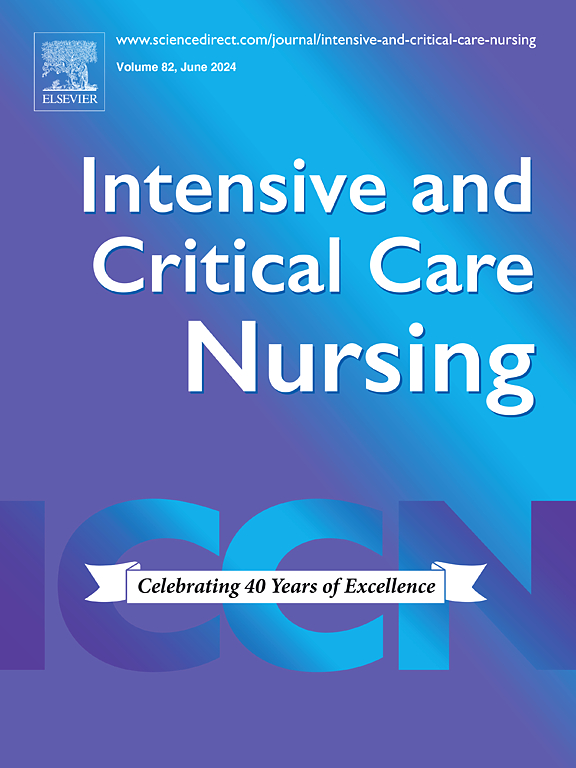The Ideal Human Care in Green ICU: An integrated AI framework for future ICU care
IF 4.7
2区 医学
Q1 NURSING
引用次数: 0
Abstract
Background
Intensive Care Units (ICUs) present a high-stakes environment where timely decision-making is critical for managing patients with life-threatening conditions. The continuous influx of complex data often challenges clinicians, increasing the risk of errors. Artificial Intelligence (AI) offers transformative potential to enhance ICU care by supporting data analysis, decision-making, and workflow efficiency.
Objective
This review aims to explore current applications of AI in ICUs, assess their impact on clinical outcomes, workflow optimization, and ethical considerations, and propose an Integrated AI Framework for enhanced critical care delivery.
Methods
A literature search was conducted across PubMed, Scopus, and Web of Science, focusing on studies published between 2014 and 2024. The data were synthesized using an inductive thematic analysis approach to evaluate AI’s impact on clinical outcomes and to identify key barriers to its integration.
Results
AI has demonstrated significant advancements in ICU care, including early detection of sepsis, prediction of cardiac arrest, and workflow optimization through decision support systems. Predictive models reduced sepsis-related mortality by up to 20%, while workflow enhancements improved medication accuracy by 30% and reduced adverse events by 25%. Advanced techniques such as natural language processing (NLP), large language models (LLMs), and multimodal data integration have further streamlined ICU operations. However, challenges remain, including algorithmic bias, data privacy concerns, and integration barriers.
Proposed Model
The Ideal Human Care in Green ICU model integrates advanced AI technologies with multidisciplinary collaboration to provide personalized, evidence-based, and patient-centered care. This model emphasizes ethical AI practices, transparency, and family engagement to ensure responsible implementation.
Conclusion
AI can transform ICU care by improving outcomes and workflows, but ethical, practical, and explainable challenges must be addressed through diverse, validated research.
Implications for clinical practice
AI integration in ICUs improves patient outcomes and workflows by enabling early detection and precise treatment, but ethical issues and real-world validation are crucial.
绿色ICU的理想人类护理:未来ICU护理的集成AI框架。
背景:重症监护病房(icu)是一个高风险的环境,及时决策对于管理危及生命的患者至关重要。复杂数据的不断涌入往往给临床医生带来挑战,增加了出错的风险。人工智能(AI)通过支持数据分析、决策和工作流程效率,为加强ICU护理提供了变革性潜力。目的:本综述旨在探讨人工智能在icu中的应用现状,评估其对临床结果、工作流程优化和伦理考虑的影响,并提出一个集成的人工智能框架,以增强重症监护服务。方法:通过PubMed、Scopus和Web of Science进行文献检索,重点检索2014年至2024年间发表的研究。使用归纳主题分析方法对数据进行综合,以评估人工智能对临床结果的影响,并确定其整合的关键障碍。结果:人工智能在ICU护理方面取得了重大进展,包括败血症的早期检测、心脏骤停的预测以及通过决策支持系统优化工作流程。预测模型可将败血症相关死亡率降低20%,而工作流程增强可将用药准确性提高30%,并将不良事件减少25%。自然语言处理(NLP)、大型语言模型(llm)和多模态数据集成等先进技术进一步简化了ICU的操作。然而,挑战依然存在,包括算法偏见、数据隐私问题和集成障碍。提出的模型:绿色ICU的理想人类护理模型将先进的人工智能技术与多学科协作相结合,提供个性化、循证和以患者为中心的护理。该模型强调道德人工智能实践、透明度和家庭参与,以确保负责任的实施。结论:人工智能可以通过改善结果和工作流程来改变ICU护理,但必须通过多样化、经过验证的研究来解决伦理、实践和可解释的挑战。对临床实践的影响:人工智能在icu中的整合通过实现早期发现和精确治疗,改善了患者的结果和工作流程,但伦理问题和现实世界的验证至关重要。
本文章由计算机程序翻译,如有差异,请以英文原文为准。
求助全文
约1分钟内获得全文
求助全文
来源期刊

Intensive and Critical Care Nursing
NURSING-
CiteScore
6.30
自引率
15.10%
发文量
144
审稿时长
57 days
期刊介绍:
The aims of Intensive and Critical Care Nursing are to promote excellence of care of critically ill patients by specialist nurses and their professional colleagues; to provide an international and interdisciplinary forum for the publication, dissemination and exchange of research findings, experience and ideas; to develop and enhance the knowledge, skills, attitudes and creative thinking essential to good critical care nursing practice. The journal publishes reviews, updates and feature articles in addition to original papers and significant preliminary communications. Articles may deal with any part of practice including relevant clinical, research, educational, psychological and technological aspects.
 求助内容:
求助内容: 应助结果提醒方式:
应助结果提醒方式:


